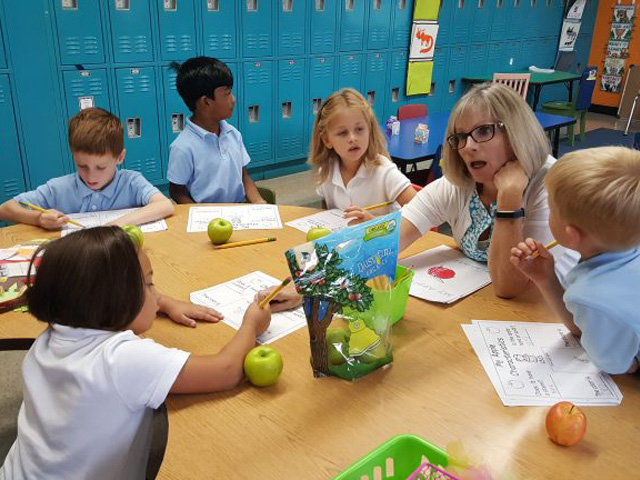It all starts with kindergarten. Children must be five years old on or before September 1st of the enrolled academic year for kindergarten.

Literacy
Over the course of the year, all students will listen, speak, read, write, and advance their existing literacy skills during this formative year. The elementary classes use the Wonders Reading series which consists of a rich array of “read-aloud” stories, nonfiction, and poems that are used to develop vocabulary and comprehension skills.
Phonemic Awareness
Kindergarten uses the Michael Heggerty Phonemic Awareness Program. This daily program teaches children to isolate sounds, manipulate the sounds, and blend and segment the sounds into spoken words. Other skills taught include rhyming, identifying onsets, identifying final and medial phonemes, substituting phonemes, and adding and deleting phonemes.
Phonics
Kindergarten uses Fundations Phonics. Fundations is a systematic and explicit phonics instruction effective for all children. It is a multi-sensory, structured literacy approach that develops students’ reading and spelling skills.
By the completion of the year, the students will:
- Learn and identify all 26 letters.
- Learn how to blend sounds to read and how to segment sounds to spell.
- Read 54 high frequency words.
- Apply comprehension skills and strategies while reading independently.
- Learn vocabulary and fluency skills.

Mathematics
Kindergarten uses the Reveal Math program. This comprehensive Kindergarten program was developed to support the Common Core State Standards for Mathematics. Reveal helps make math meaningful and exciting. Reveal emphasizes the following content standards, skills, and concepts:
- Counting and Cardinality—know number names and the count sequences, count to tell the number of objects, and compare numbers.
- Operations and Algebraic Thinking—represent addition and subtraction to 10 with objects, drawings, fingers, mental images, and ten frames.
- Numbers and Operation in Base Ten—work with numbers to gain foundations for place value, compose and decompose numbers in more than one way.
- Measurement and Data—describe and compare measurable attributes, classify and sort data.
- Geometry and Positions—identify and describe two-dimensional and three-dimensional shapes, analyze, compare, and create shapes.
Students also experience interactive SMART board lessons and games that will enhance and support the curriculum.

Religion
Our Kindergarten Religion curriculum is titled - Stories of God’s Love. This series is a user-friendly early childhood curriculum that aims to involve preschool and kindergarten-aged children and their families in exploring their Catholic faith—establishing strong connections between scripture and their daily lives. The curriculum is aligned, connected, and integrated with our 1st - 8th grade program to ensure optimal sequential growth in a child's faith formation.

Science
We use the FOSS (Full Option Science System) Next Generation Science Program which represents more than 20 years of working with teachers and students with the goal of finding the most effective ways to help all teachers teach science and all students learn science. FOSS includes a wide range of experiences that help build student understanding of science concepts. Students are actively engaged and have ownership of their learning through interactive journals and hands-on experiments. The three modules are as follows:
- Trees and Weather; Earth Science.
- Materials and Motion; Physical Science.
- Animals Two by Two; Life Science.

Social Studies
- Students will learn about community workers and their jobs, as well how we are part of a family and community. We will also discuss our family traditions.
- Students will explore holidays at the appropriate times of the year.
- Students will also complete units based on American symbols and landmarks and the Great Big World (continents).

Independence in Kindergarten
Gaining independence is a vital part of a student's successful kindergarten transition. You can help your child do this by assigning them small, age-appropriate chores, making time for unstructured play, and allowing their child to problem solve little situations when they arise. Young children actually take great pride in being able to do things by themselves. They are usually able to take on more responsibility than you think; it’s simply a matter of giving them opportunities to practice.
Handwriting
Kindergarten uses the Handwriting Without Tears Program. This program uses developmentally appropriate lessons, multi-sensory teachings, and explicit demonstrations. The students will be instructed how to use the correct grip to form uppercase and lowercase letters, numbers, words, and sentences through multi-sensory tools with reinforcement at home.
Kindergarten Events

- Family Potluck
- Donuts with a parent in the fall
- Breakfast with a parent in the spring
- Field Trips
- Weekly Buddy Reading